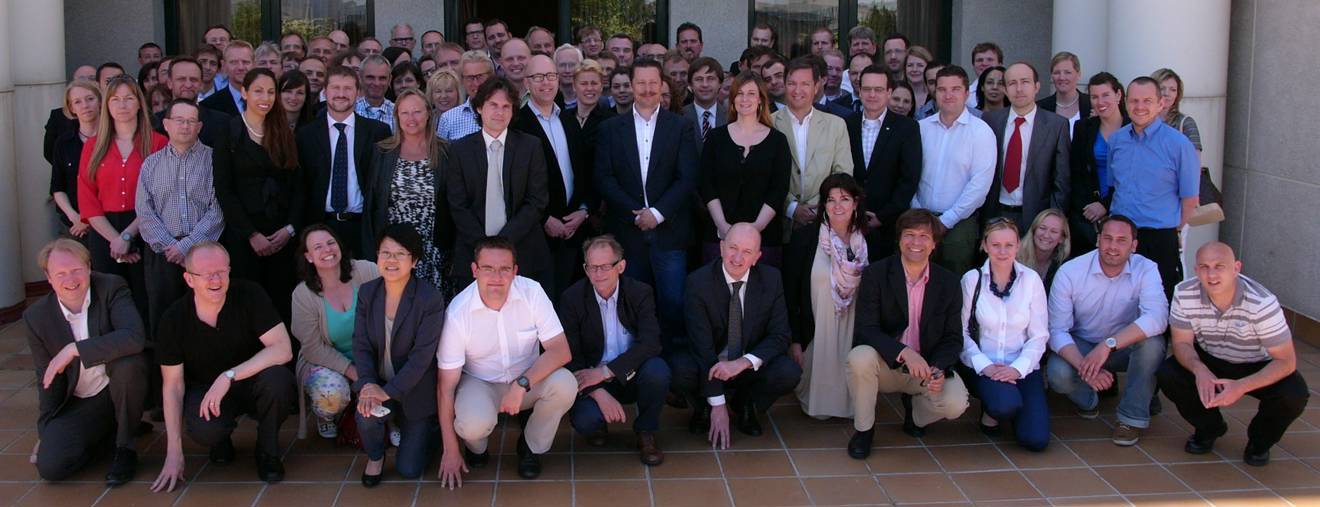
The European Union's new demonstration project, DRIVER (Driving Innovation in Crisis Management for European Resilience) was successfully launched in May 2014. This project, gathering the expertise of 37 organisations, will jointly develop solutions for improved crisis management. A distributed pan-European test-bed will be built for experimentation and testing and the most useful new tools will be collected in a comprehensive Crisis Management portfolio at the end of the project. Building upon the findings of previous research projects, DRIVER's ultimate goal is to enhance European resilience in the face of crisis situations and ascertain sustainable innovation in Crisis Management also after the end of the project.
From May 12 to May 14, 2014, representatives from the security & defence industry, from research and academia, SMEs, end-users and several European institutions, from 13 EU member states and 2 associated countries, came together in Madrid to kick off the project. With 33.4€ million funding from the European Commission under the Seventh Framework Programme, DRIVER is the largest crisis management research & innovation project in Europe, if not the world, for the foreseeable future.
Over the next four and a half years, the consortium will work on the development of a pan-European test-bed of virtually connected exercise facilities and crisis laboratories where users, providers, researchers, policy makers and citizens can work jointly and iteratively on new approaches and solutions to emerging crisis management issues. This will facilitate capability development through the provision of appropriate methodologies and infrastructures. The DRIVER Test-bed will help to develop a portfolio of crisis management tools to strengthen crisis management capabilities at member state and EU level.
The two key dimensions of DRIVER – the Test-bed and the Portfolio of Tools - are complemented by a third dimension: sharing a common understanding of crisis management across Europe. Crisis management practitioners, policy makers, technology suppliers and the citizenry will be invited to join the DRIVER Community. This constantly evolving Community will enable an intensive collaboration with and between crisis management stakeholders concerned by societal and technological innovation in CM and its up-take. The development of the DRIVER Portfolio of tools and the set-up of European test-bed facilities will produce a set of new capabilities for more effective European crisis management. The long-term sustainability of the test-bed, processes and tools will enhance European resilience and crisis management capabilities beyond the duration of the project. The project will be coordinated by European IT services leader Atos with technical and scientific support from the Swedish Defence Research Agency (FOI) and the Fraunhofer Institute for Technological Trend Analysis (INT).
PRIO will lead one of the nine subprojects which will carry out an independent monitoring on the ethical and societal dimensions of crisis management in relation to the project.
The research leading to these results has received funding from the European Community's Seventh Framework Programme (FP7/2007-2013) under Grant Agreement n°607798.
Contact: For further information write to: driver-coordination@lists.atosresearch.eu
ATOS (Project Coordinator): Fernando Kraus: fernando.kraus@atos.net, + 34 675 592 006
Consortium organisations :
- AIT Austrian Institute of Technology GmbH (Austria)
- ARTTIC (France)
- Association pour la Recherche et le Développement des méthodes et processus Industriels- Armines (France)
- ATOS Spain SA (Spain)
- Austrian Red Cross Research GmbH (Austria)
- Centre for Irish and European Security Limited (Ireland)
- Centro de Innovación Tecnológica para Logística y Transporte Mercancías Carretera (Spain)
- Dansk Røde Kors (Danish Red Cross) (Denmark)
- Deutsches Zentrum für Luft- und Raumfahrt e.V. - DLR (Germany)
- DIN Deutsches Institut für Normung e.V. (DIN German Institute for Standardization (Germany)
- Disaster Waste Recovery (United Kingdom)
- Ecorys Nederland B.V. (The Netherlands)
- Edisoft (Portugal)
- E-Semble (The Netherlands)
- EPLFM (Entente Pour la Forêt Méditerranéenne) (France)
- European Organisation for Security SCRL (Spain)
- European Union Satellite Centre (Spain)
- Fraunhofer-Gesellschaft zur Förderung der angewandten Forschung e.V. (Germany)
- Frequentis AG (Austria)
- GMV Aerospace and Defence SA Unipersonal (Spain)
- HKV Lijn in Water B.V. (The Netherlands)
- Institute of Information and Communication Technologies (Bulgaria)
- ITTI sp. z o.o. (Poland)
- JRC - Joint Research Centre- European Commission (Belgium)
- Magen David Adom in Israel (Israel)
- Myndigheten för Samhällsskydd och Beredskap (Sweden)
- Nederlandse Organisatie voor Toegepast Natuurwetenschappelijk Onderzoek- TNO (The Netherlands)
- Peace Research Institute Oslo - PRIO (Norway)
- Pole Euroméditerranéen sur les Risques Association (France)
- Public Safety Communication Europe Forum (Belgium)
- Q4PR Limited (Ireland)
- Technisches Hilfswerk THW (Germany)
- THG- City of the Hague (The Netherlands)
- Thales Communications & Security (France)
- The British Red Cross Society Royal Charter (United Kingdom)
- Totalförsvarets Forskningsinstitut (Sweden)
- Universität Stuttgart IAT (Institut für Arbeitswissenschaft und Technologiemanagement) (Germany)
- Westfälische Wilhelms- Universität Münster (Germany)





